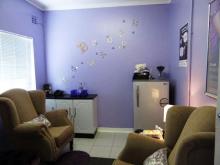Zimbabwean employers urged to promote a conducive environment for nursing mothers to continue breastfeeding at the workplace
Harare, 7 August 2015 : This was said during the official launch of World Breastfeeding Week which was held at the Lafarge cement plant in Harare. Lafarge is a cement producing company which has strong policies about mothers continuing breastfeeding while at work; a state of the art lactation room where mothers can take a break from work to breastfeed their babies or to express and store breastmilk; and a day care center for babies and children from one year old where mothers can leave their babies and go and breastfeed them during their breaks.
This year’s Breastfeeding Week was launched under the theme Breastfeeding and Work, let’s make it Work , and it emphasizes the need for better support systems and policies to enable working mothers to breastfeed. WHO recommends exclusive breastfeeding to begin within one hour of birth until six months of age. Nutritious complementary foods should then be added while continuing to breastfeed for up to two years or beyond.
Lafarge Cement company took a huge initiative towards finding out why they could not attract female workers, and were unable to retain the few that they had. A review of the workplace wellness program for women was conducted in 2013, The review revealed a very unsupportive factory environment for breast feeding mothers. There was lack of a proper room and privacy for women who needed to express breastmilk, lack of safe storage areas for expressed breast milk ,and unsupportive supervisors in a male dominated environment. No proper time was set aside for women to either go and breastfeed or express breastmilk for later use. These were cited by women as the greatest barriers for seeking employment and continuing their employment with Lafarge.
In response to these barriers, Lafarge, with the support of the Ministry of Health and Child Care established a Lactation Policy for female workers. A special room was identified in the clinic area and renovated. The room, named “The Lactation Room,” was equipped with a hand washing sink, chairs, a refrigerator for storing expressed breast milk , and breastfeeding messages. The room is also equipped with anti-microbial wipes for hygiene purposes, and allows for privacy which enables mothers to relax comfortably whenever they need to breastfeed or express breast milk for later use.
The company also offers paid breaks plus one hour off work time for nursing mothers to be home with the baby every day for the first 6 months, with flexibility if extra time is needed. A Day Care Centre for babies and children from one year old was also opened within the premises, where mothers can leave their babies and go and breastfeed them during their breaks. Lafarge’s Human Resource Director and Team Leader for the Health and Wellness Program, Ms Nyika, said after the introduction of the lactation room and day care center, fewer absences by nursing mothers have showed immediate return on investment for the company; higher job satisfaction; increased loyalty; increased ability to focus on job responsibilities; higher return to work postpartum, and lower turnover.
In his statement, WHO Zimbabwe, Dr David Okello congratulated Lafarge for their effort in supporting breastfeeding at the work place. He said globally, Zimbabwe is doing well on exclusive breastfeeding rates. The current rate for exclusive breastfeeding in Zimbabwe stands at 41%, against a WHA global target of at least 50% by 2025. “Our challenge now, is to make breastfeeding work in the workplace,” said Dr Okello. He, however, said that if employers, the Ministry of health and child care, and partners work together, “ we can help working women to breastfeed and reap the benefits for their workplaces; for themselves; for their children; and for the health and well-being of future generations.”
The same sentiments were echoed by the Honorable Minister of Health and Child Care, Dr David Parirenyatwa who also appreciated the efforts by Lafarge Cement of creating a conducive environment for nursing mothers to continue to breastfeed at the workplace. Dr Parirenyatwa said he viewed Lafarge’s initiative as “best practice” and urged other employers to emulate what Lafarge has done. He also said that the Ministry of Health and Child Care is willing to work with companies that want to develop workplace policies that support the right of working mothers to breastfeed their babies on the job.
Breastfeeding week is commemorated during the first week of August every year where countries join together to celebrate, protect, support and promote breastfeeding
______________________________________
For more information, please contact:
JULIAS Wendy, Email: juliasw [at] who.int (juliasw[at]who[dot]int)






